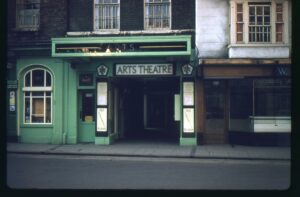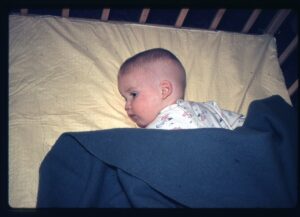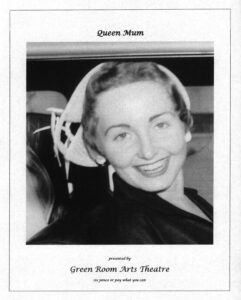I Say A Little Prayer
Mom said I smiled in my crib in the dark. My smile was “cribbed” from hers. But she wasn’t smiling when I wandered blind into the mug’s game of playwright, though she persevered as my audience—the maternal smile in the dark.
Directly and indirectly, she communicated her opinion of the stages of my career. I could not disagree with her assessments: late start (late 20s), slow development, drift from the mainstream, prone to expansiveness, poor “networking” skills. Name dropping O’Casey, Behan, Wilde, Shepard, Synge, Beckett, Brecht, Chekhov, Ionesco, Silver, Wellman, Widmer, Kane, Eno, Jelinek, Goethe and Shakespeare did not score points. (More about them in a different chapter.) I should have known by age three that she could be a tough audience. The celebrated discoverers of the DNA double helix, whose lab was near our temporary home in Cambridge, England, spent, she would reminisce, a surprising amount of time drinking tea, a peculiar example to set for her boys, who should, pursuant to her morning song/prayer:
Rise and shine!
Magic Moments
CAMBRIDGE. After the originary crib was lifted in April 1960 from Mercy Hospital in Pittsburgh PA to the suburb of Mt. Lebanon, the scene shifts to Cambridge, England, where Dad was “doing his bit,” as the English said, as an Air Force doctor. During their first sojourn (1957-59), my parents were theatregoers, as dozens of playbills in my possession bear witness.

In April 1957, they saw Peggy Ashcroft at Stratford-upon-Avon in Shakespeare’s As You Like It. In November in London, Wendy Hiller and Ralph Richardson in Robert Bolt’s Flowering Cherry. To Cambridge in September 1958 came Peter O’Toole and Siân Phillips for John Hall’s The Holiday. In June 1959, there was Joan Plowright in Arnold Wesker’s Roots. Who can forget John Boyd-Brent as Dr. Bitterling, June Speight as Miss Black-Planorbis and future playwright Alan Ayckbourn as Stapleton (Lolly Paradise) in Cards of Identity by Nigel Dennis? My parents. What they saw “treading the boards” did not become family lore. I wish I were a fly on the wall (possessing one pence for admission) with them at, say, 1958’s Hamlet of Stepney Green, a “sad comedy with some songs,” the first effort by Bernard Kops, who worked as a docker, chef, salesman, waiter and “barrow boy” (a boy or man who sells wares from a barrow in the street) before writing his Hamlet.
Mom was a lifelong mailer of newspaper clippings, including theater reviews. Sampling from a manila envelope stuffed with theater clippings from Cambridge Chapter I, I try to put myself in her place by reading Kenneth Tynan in The Observer. Although the reviews were welcome and informative, I did not confess to her that they became deflating reminders that my plays were dead letters which did not see the stage lights, to be panned or praised.
By Chapter II (1963-64), Mom has seven offstage distractions: three boys at home and four in Liverpool. Like many contemporaries, Mom must have sung Beatles hits around the house. One of her fans had a repertoire too.
Well, she looked at me
And I, I could see
That before too long
I’d fall in love with her
And he had begun to have doubts about the light.

PITTSBURGH. Although we were not an arts family, we did not fit neatly in suburbia’s anti-art squares. Reading was encouraged. Mom’s mother played the piano and sang. As a girl, Aunt Ruth (Mom’s only sibling) performed around Pittsburgh and on KDKA radio in a group called Starlets on Parade, and she eventually moved to Manhattan with acting aspirations. Cousins were musicians. In elementary school, I was miscast as a circus tiger and (in The Amiable Giant) a wicked wizard; and, adorned with top hat and red bow tie, I “danced” and “sang” a rendition of By the Light of the Silvery Moon. Fifteen years passed before the next (and last) roles, in two college productions (see Wittenberg II).
Mom was not smiling for, nor did she applaud, a slapstick preshow which played nearly every Sunday in the family car. Late for Mass and half-dressed, we boys (now four of us) would wrestle ourselves into our “Sunday best” before we reached the church parking lot. The show itself received mixed reviews. Surnames in the church bulletin were given thumbs up for their comedic value. The post-Vatican II folk music was better than silence. Communion got us on our feet and the blood circulating. Post-show confessions to a concealed priest behind a stage door were, however, very unpopular with the critics.
You’ve Got a Friend
The first production to change my life was Pittsburgh Public Theater’s Juno and the Paycock by Sean O’Casey, which ran from November 19, 1981 to January 3, 1982. Mom and brother Eric were there with me; we could not have predicted that the humor and pathos of the Boyles and Joxer Daley would contribute to another dramatic turn: my three years in Ireland (see Wittenberg II). Mom went to shows at the Public from its founding in 1975 until her death on July 21, 2019. She was also a regular at other local venues, such as the Pittsburgh Irish and Classical Theatre. Her favorite Pittsburgh playwright (after me?) was August Wilson.
LONDON. David Hare and Howard Brenton’s Pravda, which Mom and I saw together at London’s National Theater in Fall 1986, was notable for the sole purpose of checking off the National as a destination. More forgiving than I, she returned to the National (she had wanderlust in common with her mother, who believed the (non-existent) family crest should feature luggage), as a March 2001 postcard attests:
I arrived in London yesterday and made a bee-line for the National. The backstage tour was a bargain. The sound director was using a Steely Dan cut for a sound check. Loved it!
During the same trip, she returned to the Cambridge Arts Theatre.
SAN DIEGO. Mom seemed to enjoy my one-act comedy The Undertow, staged at a family gathering. She missed the 2003 staged reading (before a paying audience!) of Play in the Dark, which is about coitus interruptus. Mom did not request to view the recording of that one. The family’s ambassador to the land of my writing, she gave networking advice and proofread—skills acquired in her own career in banking (international loan review). Here she is on August 15, 2007 in an email with the subject line “Fresh Eyes” about the newly live website for my play Set in Venice:
No prosecco pics? It’s difficult without seeming ad-like, I’ll admit. Narratives are good but need a little ‘easier to read’ feel, say–bolding for actors/parts, etc…‘wrenched from’ Basilica: They were taken in or cast out of the setting. This latter is the way it reads…Great idea to use the G. Verdi material. Looks great. You’ve done it elsewhere, I think…That’s it for now. I have to start getting ready to go to NYC tomorrow.
Manhattan
NEW YORK. During my teens, Mom co-produced a gift for our family’s New York celebrity, her sister. After auditioning several framed playbills, we escorted the finalists to an art gallery and framing store on Alfred Street in Mt. Lebanon for the final cuts: layout, frame, matting and price. The finished trio joined a large cast on the walls and shelves of an apartment near Lincoln Center already chock-a-block with theatricalia.
A sister on the Upper West Side can do things to a person, such as turn the Big Apple into a favorite city and Broadway (with some Off Broadway thrown in for offbeat measure) into heaven on earth (or the other shop, depending upon the play or musical). Sometimes Mom did homework before her road trips via the Pennsylvania Turnpike. I wish I could remember what she said about continuing ed. classes at the University of Pittsburgh, one of her alma maters, such as Ladies Wielding Pens: Modern Plays by Women in 2015 and Intrigue! Deception! Conspiracy! The Verse Dramas of Maxwell Anderson in 2017. (Maxwell Anderson?! Only in New York.) I wish I had quizzed her on the productions which left the most lasting impressions on her.
As the years passed, my tastes went from mainstream to “alternative.” Mom listened to my enthusiasms and acted on them. I cringe at the thought of the graphic content in the Wooster Group’s Vieux Carré, which she saw in March 2011, reporting afterward to the family:
This is a seldom-performed play based on a work by Tennessee Williams. The Wooster Group mounted the production. TWG is Greg and Suzanne’s favorite troupe, and indeed they are listed as supporters in the program. Kembell and I waited for an hour in the lobby—sitting on the floor reading the NY Times. Persistence paid off. We scored tickets. Play was interesting. It’s fun to see something new.
Deacon Blues
 COLORADO. A lasting regret is to have failed to make her proud with a professionally produced play. Another is to have forgotten to bring a DVD of the transformative event in my theater life, the Woosters’ Hamlet, to share (there’s no graphic content!) during what turned out to be our last visit in May 2019. The occasion was a family union in Boulder, where a member of the next generation, her grandson and my nephew Ben, was a Ph.D. candidate, after which she and I had a few days in the area on our own. Serious Play: Design in Midcentury America at the Denver Art Museum was a reprise of familiar stages. The theater in Rocky Mountain National Park was site-specific: mountain peaks, snow, moose and other wildlife. In Estes Park, a talented tour guide made the majestic Stanley Hotel, where Stephen King was inspired to write The Shining, come alive. Mom and I felt at home in the Park Theatre, the oldest cinema in the western United States. At Denver airport, I struggled to see her as she, after smiling farewell, disappeared in the crowd on the passenger boarding bridge.
COLORADO. A lasting regret is to have failed to make her proud with a professionally produced play. Another is to have forgotten to bring a DVD of the transformative event in my theater life, the Woosters’ Hamlet, to share (there’s no graphic content!) during what turned out to be our last visit in May 2019. The occasion was a family union in Boulder, where a member of the next generation, her grandson and my nephew Ben, was a Ph.D. candidate, after which she and I had a few days in the area on our own. Serious Play: Design in Midcentury America at the Denver Art Museum was a reprise of familiar stages. The theater in Rocky Mountain National Park was site-specific: mountain peaks, snow, moose and other wildlife. In Estes Park, a talented tour guide made the majestic Stanley Hotel, where Stephen King was inspired to write The Shining, come alive. Mom and I felt at home in the Park Theatre, the oldest cinema in the western United States. At Denver airport, I struggled to see her as she, after smiling farewell, disappeared in the crowd on the passenger boarding bridge.
Treasure these few words till we’re together
Keep all my love forever
P.S. I love you
You, you, you
Recessional
Keep Your Faith to the Sky (1979), Willie Scott & The Birmingham Spirituals
Subheads
Aretha Franklin, Perry Como, Carole King, Blossom Dearie and Steely Dan song titles